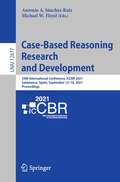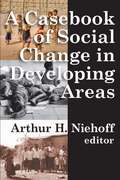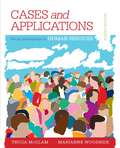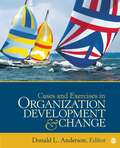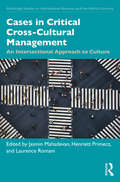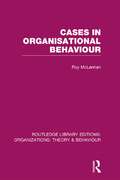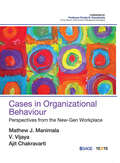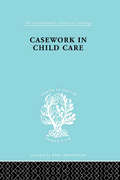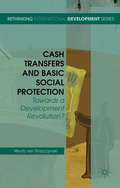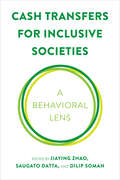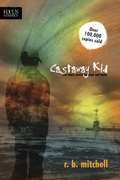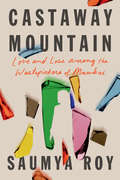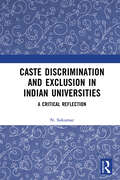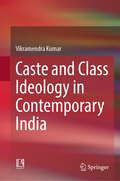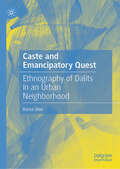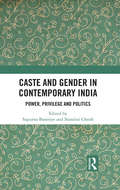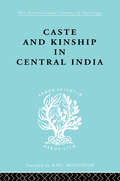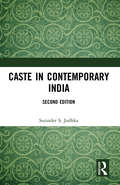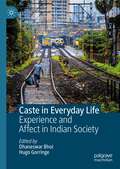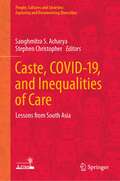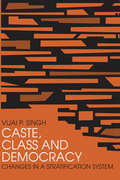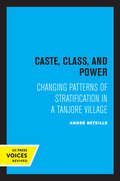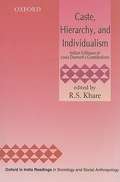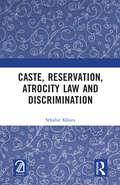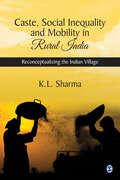- Table View
- List View
Case-Based Reasoning Research and Development: 29th International Conference, ICCBR 2021, Salamanca, Spain, September 13–16, 2021, Proceedings (Lecture Notes in Computer Science #12877)
by Antonio A. Sánchez-Ruiz Michael W. FloydThis book constitutes the proceedings of the 29th International Conference on Case-Based Reasoning, ICCBR 2021, which took place in Salamanca, Spain, during September 13-16, 2021. The 21 papers presented in this volume were carefully reviewed and selected from 85 submissions. They deal with AI and related research focusing on comparison and integration of CBR with other AI methods such as deep learning architectures, reinforcement learning, lifelong learning, and eXplainable AI (XAI).
Casebook of Social Change in Developing Areas
by Arthur H. NiehoffMost early approaches to encouraging social development focused on economic and technical issues. This volume begins from the premise that economic and technical patterns are embedded in cultural patterns. These patterns of custom and belief are sometimes elaborate, and they can act as barriers to technical or economic change. This volume presents case studies of social change, developing a model for analysis and action. An analytic guide is presented for each case history, and the editor points out factors that influenced the outcome of the project. The volume ais designed for people in the field, and is intended to be of practical usefulness.From hundreds of case histories, Arthur H. Niehoff selected nineteen that most clearly exemplify the technique of the innovator, the motivations of potential recipients and the reactions of these recipients due to local cultural patterns and values. These case histories of efforts at innovation in Latin America, Africa, the Middle East and Asia illustrate the specific problems facing American change agents abroad and define the basic ingredients of socio-economic change. Covering the types of problems innovators most frequently encounter in developing nations, Niehoff's compendium of successful and unsuccessful attempts at change demonstrates concretely the theoretical principles set forth.Prospective change agents gain fruitful insights into many problems by studying the practical examples of the programs of change agents in a wide variety of situations. Each of the case-histories is analyzed in the context of a socio-cultural concept of change, emphasizing the principles and factors of change. This book presents essential guidelines for perceiving and dealing with the cultural aspects of a change situation for all students of applied anthropology and social change.
Cases and Applications for An Introduction to Human Services
by Marianne Woodside Tricia McclamThis hands-on work-text equips students with a practitioner perspective through realistic cases about the profession of human services. Students study and apply concepts using cases, quizzes, and questions that encourage them to reflect upon their own understandings of the concepts. Each chapter begins with a focus issue, followed by case and summary sections, case questions, self-assessments, and case comments.
Cases and Exercises in Organization Development & Change
by Dr Donald L. AndersonThis comprehensive collection of cases and exercises allows students to practice organization development (OD) skills at the same time as learning about theories of organizational change and human behavior. The first part of the book presents cases about the OD process, and the second part includes cases in organization-wide, team, and individual interventions. The final part provides practical exercises that make the course material come alive through realistic scenarios that organizational change practitioners regularly experience.
Cases in Critical Cross-Cultural Management: An Intersectional Approach to Culture (Routledge Studies in International Business and the World Economy #1)
by Jasmin Mahadevan; Henriett Primecz; Laurence RomaniThis book is a collection of 16 empirical cases in critical Cross-Cultural Management (CCM). All cases approach culture in CCM beyond national cultures, and all examine power as an integrative part of any cross-cultural situation. The cases also consider diversity in the sense of culturally or historically learned categorizations of difference (such as gender, race, ethnicity, religion and class), and acknowledge how diversity categories might differ across cultures. Furthermore, each case suggests a specific method or concept for improving upon the situation. Out of this approach, novel insights emerge: we can see how culture, power and diversity categories are inseparable, and we can understand how exactly this is the case. The uses and benefits of this book are thus both conceptual and methodological; they emerge at the intersections of Critical CCM and diversity studies. All cases also discuss implications for practitioners and are suitable for teaching. Mainstream CCM often limits itself to comparative models or cultural dimensions. This approach is widely critiqued for its simplicity but is equally used for the exact same reason. Often, academics teach this approach whilst cautioning students against implementing it, and this might be simply due to a lack of alternatives. Through means of rich empirical cases, this book offers such an alternative. Considering the intersections of culture, diversity and power enables students, researchers and practitioners alike to see ‘more’ or ‘different’ things in the situation, and then come up with novel approaches and solutions that do justice to the realities of culture and diversity in today’s (and the future's) management and organizations. The chapters of this book thus offer concepts and methods to approach cross-cultural situations: the conceptual gain lies in bringing together CCM and (critical) diversity studies in an easily accessible manner. As a methodological contribution, the cases in this book offer the concise tools and methods for implementing an intersectional approach to culture.
Cases in Organisational Behaviour: Organizations) (Routledge Library Editions: Organizations)
by Roy McLennanThis is a comprehensive, systematic casebook which demonstrates the contribution of research to the formulation and resolution of organisational problems actually faced by managers. The cases are presented in clusters which centre on a particular aspect of organisational behaviour: motivation, groups, technology, leadership, structure, change and development. Each cluster is introduced by comments on the cases and references to the theoretical literature. The introduction reviews the case method and provides suggestions for using it.
Cases in Organizational Behaviour: Perspectives from the New-Gen Workplace
by Mathew J. Manimala V. VijayaNew-gen organizations are different in their design, structure, culture and processes; new-gen employees are different in their attitudes, aspirations and behaviour - they need to be managed differently. With the development of new-gen organizations and the emergence of new-gen professionals, there is a need to document the behavioural issues and concerns of these workplaces. Cases in Organizational Behaviour presents 120 cases from the new-gen workplace that provide the readers insights into 'the good, the bad and the ugly' facets of the corporate lives of new-gen professionals. Based on real-life work experiences of corporate executives working with indigenous or multinational organizations operating in India, these cases address a variety of issues faced by professionals in new-gen organizations and their behavioural implications at the workplace. Key Features • 120 cases, classified under 10 major sub-themes of organizational behaviour (OB), covering as many as 18 professional sectors • Ideal for educating and training students aspiring to be part of new-gen organizations and employees already working with them • A general introduction along with abstracts and discussion questions for each case, to assist instructors and participants
Casework in Childcare (International Library of Sociology)
by Jean KastellFirst published in 1998. Routledge is an imprint of Taylor & Francis, an informa company.
Cash Transfers and Basic Social Protection
by Moritz Von GliszczynskiThe author offers a ground-breaking analysis of the political discourses that facilitated the rise of cash transfers as instruments of development policy since the 1990s. Using an innovative theoretical framework, von Gliszczynski gives a broad, yet detailed, overview of the history of basic social protection in global policy and identifies discursive shifts that radically changed the perception of cash transfers in global policy. His in-depth analysis of political discourses illustrates inhow far the career of cash transfers was part of a 'development revolution' and shows to what extent the ideas behind development policy have truly changed. By demonstrating that cash transfers are part of a specifically developmental model of social protection, this book also sheds light on potential future directions of social policy in the Global South.
Cash Transfers for Inclusive Societies: A Behavioral Lens (Behaviorally Informed Organizations)
by Dilip Soman Jiaying Zhao Saugato DattaThe latest title in the Behaviourally Informed Organizations series offers practical advice on how best to successfully design, deliver, and evaluate efficient cash transfer programs, with a view to alleviating poverty. While much progress has been made in reducing poverty worldwide – especially in the pre-pandemic era – it is fair to say that an unacceptably large proportion of the world’s people still live in poverty. Cash Transfers for Inclusive Societies sheds light on the widely prevalent cash transfer programs. The book asks these central questions: What is the state of the art in the development of welfare programs? What do we know works in these programs and what does not? How can an understanding of behavioral science better inform the design, delivery, and evaluation of welfare programs? The latest title in the Behaviourally Informed Organizations series, the book develops a nuanced framework for how governments, practitioners, and society in general should design cash transfer programs to improve inclusivity, reduce poverty, and improve equality. It draws on field experiments and case studies to showcase past successes, while also building frameworks and developing prescriptive advice that we can give to practitioners who are looking to design a behaviorally informed cash transfer program. With contributions from leading academics as well as seasoned practitioners, Cash Transfers for Inclusive Societies presents a new model to policymakers to study and shift the discourse on poverty alleviation from purely economic factors to also behavioral ones.
Castaway Kid
by R. B. MitchellRob Mitchell is one of the last “lifers” raised in an American orphanage. Left by a dysfunctional family in an Illinois children's home, he grew up with kids who were not friends but rather “co-survivors.” After becoming a Christian as a teenager, Rob found what he was looking for, home and family, in a relationship with God. Rob was able to overcome his past, forgiving his relatives and forging healthy family relationships of his own.
Castaway Mountain: Love and Loss Among the Wastepickers of Mumbai
by Saumya Roy"'I came to see the mountains as an outpouring of our modern lives,' Roy writes, 'of the endless chase for our desires to fill us.' Readers of Behind the Beautiful Forevers will be drawn to this harrowing portrait."— Publishers Weekly"Castaway Mountain deserves every accolade. A stunning achievement."— Kiran Desai, Booker Prize Winner, author of Inheritance of Loss.All of Mumbai&’s possessions and memories come to die at the Deonar garbage mountains. Towering at the outskirts of the city, the mountains are covered in a faint smog from trash fires. Over time, as wealth brought Bollywood knock offs, fast food and plastics to Mumbaikars, a small, forgotten community of migrants and rag-pickers came to live at the mountains&’ edge, making a living by re-using, recycling and re-selling. Among them is Farzana Ali Shaikh, a tall, adventurous girl who soon becomes one of the best pickers in her community. Over time, her family starts to fret about Farzana&’s obsessive relationship to the garbage. Like so many in her community, Farzana, made increasingly sick by the trash mountains, is caught up in the thrill of discovery—because among the broken glass, crushed cans, or even the occasional dead baby, there&’s a lingering chance that she will find a treasure to lift her family&’s fortunes. As Farzana enters adulthood, her way of life becomes more precarious. Mumbai is pitched as a modern city, emblematic of the future of India, forcing officials to reckon with closing the dumping grounds, which would leave the waste pickers more vulnerable than ever. In a narrative instilled with superstition and magical realism, Saumya Roy crafts a modern parable exploring the consequences of urban overconsumption. A moving testament to the impact of fickle desires, Castaway Mountain reveals that when you own nothing, you know where true value lies: in family, community and love.
Caste Discrimination and Exclusion in Indian Universities: A Critical Reflection
by N. SukumarThis book studies the exclusion and discrimination that is meted out to Scheduled Caste (SC) students in the Indian Higher Education system, and the psychosocial consequences of such practices. It foregrounds the conceptual debates around caste, exclusion, and reservations in Indian academia, discussing the social dominance and the roots of prejudices in the university spaces. The volume reflects upon the fragile social world in which students from the margins struggle for survival in the academic space. It reveals that these students navigate the various facets of academia – like classrooms, pedagogy, scholarships, hostels, peer groups, and teachers – only to find the academic space a dystopian universe. The book also sheds light on suicide cases committed by the marginalized groups as a testimony of protest. Based on in-depth ethnographic research, this book will be of interest to teachers, students and researchers of education, sociology, political science, psychology, and exclusion studies. It will also be useful for policymakers, social activists, NGOs, research centers, and those working in higher education, reservations, public policy, caste, and exclusion studies.
Caste and Class Ideology in Contemporary India
by Vikramendra KumarThis volume explores contemporary caste dynamics in India, combining theoretical insights with rich empirical evidence. It offers an insightful examination of how caste practices, particularly concerning marginalized communities or Dalits, have transformed over the years. The book delves into the persistent yet evolving nature of caste hierarchies, highlighting both progress and ongoing challenges these communities face in their quest for autonomy and dignity. It examines how Dalits navigate social power imbalances, face social boycotts, and violent resistance despite breaking free from traditional dependency. It provides a nuanced account of the intersection between religion and caste, exploring movements like Ad-Dharm and the establishment of community centers for worship and social activities. The volume also sheds light on the shifting political landscape, discussing the rise of backward castes and the increasing assertion of Dalit identity. By drawing parallels between caste and race/ethnicity studies, it delves into how caste identities continue to perpetuate economic and social inequalities. This book is a crucial resource for scholars, students, and anyone interested in understanding the complexities of caste and class in modern India.
Caste and Emancipatory Quest: Ethnography of Dalits in an Urban Neighborhood
by Rama DeviThe book unravels the entangled relationship between ascriptive identity (caste) and space (urban) and how this interaction (re)moulds urban stratification. Urban rather represents a liminal space while offering promising opportunities to aspire and achieve upward mobility, it presents structural constraints frustrating the march of Dalits to claim desired mobility. Through descriptive and nuanced accounts of various aspects of Dalit lives in urban, it foregrounds how caste permeates everyday city life. The book debunks the mirage of urban castelessness.
Caste and Gender in Contemporary India: Power, Privilege and Politics
by Nandini Ghosh Supurna BanerjeeThis book explores the intersectional aspects of caste and gender in India that contribute to the multiple marginalities and oppressions of lower castes, with particular reference to Dalits, Muslims and women. It moves beyond the conventional accounts of experiences of women in unequal social and political relationships to examine how caste as a system and ideology shapes hegemonic masculinity and feminization of work, and thus contributes to the violence against women. The volume looks at their everyday lived realities within and across diverse social and political contexts — families, education systems, labour, communities, political parties, power, social organisations, the politics of representation and the writing of the subaltern women. With a range of empirical work, it brings forth the complexities of identity politics and further analyses its limits in regional and historical frameworks. This book will be of interest to students, scholars and specialists in caste and gender studies, exclusion and discrimination studies, sociology and social anthropology, history and political science. It will also be useful to Dalit writers and people working in the development sector in India.
Caste and Kinship in Central India: A Study of Fiji Indian Rural Society (International Library of Sociology)
by Adrian C. MayerFirst published in 1998. Routledge is an imprint of Taylor & Francis, an informa company.
Caste in Contemporary India
by Surinder S. JodhkaCaste is a contested terrain in India’s society and polity. This book explores contemporary realities of caste in rural and urban India. It examines questions of untouchability, citizenship, social mobility, democratic politics, corporate hiring and Dalit activism. Using rich empirical evidence from the field across Punjab, Uttar Pradesh, Delhi and other parts of north India, this volume presents the reasons for the persistence of caste in India from a new perspective. The book offers an original theoretical framework for comparative understandings of the entrenched social differences, discrimination, inequalities, stratification, and the modes and patterns of their reproduction. This second edition, with a new Introduction, delves into why caste continues to matter and how caste-based divisions often tend to overlap with the emergent disparities of the new economy. A delicate balance of lived experience and hard facts, this persuasive work will serve as essential reading for students and teachers of sociology and social anthropology, social exclusion and discrimination studies, political science, development studies and public policy.
Caste in Everyday Life: Experience and Affect in Indian Society
by Hugo Gorringe Dhaneswar BhoiThis edited volume brings together a range of scholars to reflect on the varied ways in which caste is manifested and experienced in social life. Each chapter draws on different methods and approaches but all consider lived experiences and experiential narrations. Considering Guru and Sarukkai’s path-breaking work on ‘Experience, Caste and the Everyday Social’ (2019), this volume applies the insights of the theories to multiple settings, issues and communities. Unique to this volume, Brahmin and other dominant castes' experiences are considered, rather than simply focusing on the lives of oppressed castes (Dalits). Analysis of cross-caste friendships or romances and marriages, furthermore, brings out the intimate and ingrained aspects of caste. Taken together, therefore, the contributions in this volume offer rich insights into caste and its consciousness within the framework of everyday experiences.
Caste, COVID-19, and Inequalities of Care: Lessons from South Asia (People, Cultures and Societies: Exploring and Documenting Diversities)
by Sanghmitra S. Acharya Stephen ChristopherThis book explores how social discrimination in South Asia contributes to health disparities and impedes well-being. Specifically, it addresses how marginalization shapes health outcomes, both under normal circumstances and specifically during the COVID-19 pandemic. Coming from diverse backgrounds and representing different academic disciplines, the authors have contributed a range of chapters drawing from quantitative and ethnographic material across South Asia. Chapters address reservation politics, tribal lifeways, Dalit exclusions from governmental institutions, Muslim ghettoization, gendered domestic violence, social determinants of health among migrant workers, and the pandemic fallout across South Asian society, among other subjects. Scholars draw on decades of experience and firsthand ethnographic fieldwork among affected communities. The chapters provide an innovative analysis, often in real time, of the human toll of casteism, classism, patriarchy, and religious intolerance—many set against the spectre of COVID-19. Many authors not only present social critiques but also offer specific policy recommendations. The book is of great interest to social scientists, public health practitioners, and policy advocates interested in addressing systemic inequalities and ensuring that future pandemics are not disproportionately felt by the most vulnerable.
Caste, Class and Democracy
by Vijai P. SinghThis volume is an introduction to the role of caste and class in Indian society, meant to emphasize certain important aspects of Indian society such as continuity and change in caste, economic classes, status of women, status of Harijans, village poli-tics, overseas Indians, and casteism and tribalism. Its theoretical interest is to explain the dynamics of social inequalities in Indian society.All but one of the essays are based on research conducted in India. The other is based on research on Indian plantation workers in Sri Lanka, and included here to demonstrate that the concepts of caste and class are relevant to understanding In-dians who have emigrated to overseas countries.
Caste, Class, and Power: Changing Patterns of Stratification in a Tanjore Village
by Andre BeteilleThis title is part of UC Press's Voices Revived program, which commemorates University of California Press’s mission to seek out and cultivate the brightest minds and give them voice, reach, and impact. Drawing on a backlist dating to 1893, Voices Revived makes high-quality, peer-reviewed scholarship accessible once again using print-on-demand technology. This title was originally published in 1965.
Caste, Hierarchy, and Individualism: Indian Critiques of Louis Dumont’s Contributions
by Ravindra S. KhareOrganized around Indian responses to the work of Louis Dumont, the essays discuss the logic, application, and problems associated with Dumont's influential structural and comparative method.
Caste, Reservation, Atrocity Law and Discrimination
by Sthabir KhoraThis book is a collection of essays based on the thoughts generated by teaching courses and doing research related to the sociology of education and sociology of law over the years in TISS. It compiles theorizations, judgements, consequences, and ramifications to present a collection of free-thinking essays around the interrelated themes of caste, reservation, atrocity law, and discrimination. While it takes into account existing thinking on particular matters, it also reaches new junctures and presents them to the reader. Among other topics, this book also details the academic strategy for undermining caste, discusses the popular polemic around reservation, and explores the interface between criminal law and caste.The subject matter of this book also includes: Escape from Caste Through Conversion: Is there a Way Out or a Way In? Reservation and the Creamy Layer Principle: Solving the Puzzle Questioning Excellence: Expelling 73 Students in IIT Roorkee Lacking the Basics: The Supreme Court Judgement on Atrocities Act Law and Exclusion Print edition not for sale in South Asia (India, Sri Lanka, Nepal, Bangladesh, Pakistan or Bhutan)
Caste, Social Inequality and Mobility in Rural India: Reconceptualizing the Indian Village
by K L SharmaCaste, Social Inequality and Mobility in Rural India: Reconceptualising the Indian Village investigates and presents a holistic view of today’s rural India by analysing different social aspects such as caste, migration, mobility, education and inequalities. It further studies the village social structure comprising peasants, artisans, weavers and the middle class, and the role of education in reshaping the social life of rural people. It challenges current conceptualisation and understanding of caste as a system, caste mobility, caste–class polarity and country–town divide. This book also argues that caste as a system has ceased to exist, but caste persists discretely as a non-systemic means of appropriation for political and social ends. This interdisciplinary dynamic study reconceptualises the ‘village’ by explaining the emerging social trends and patterns of social stratification in contemporary rural India.
